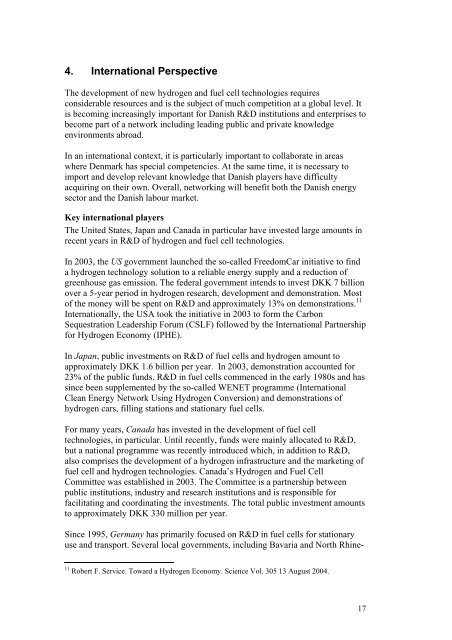Danish Strategy for Hydrogen and Fuel Cells - HY-CO Home
Danish Strategy for Hydrogen and Fuel Cells - HY-CO Home
Danish Strategy for Hydrogen and Fuel Cells - HY-CO Home
Create successful ePaper yourself
Turn your PDF publications into a flip-book with our unique Google optimized e-Paper software.
4. International Perspective<br />
The development of new hydrogen <strong>and</strong> fuel cell technologies requires<br />
considerable resources <strong>and</strong> is the subject of much competition at a global level. It<br />
is becoming increasingly important <strong>for</strong> <strong>Danish</strong> R&D institutions <strong>and</strong> enterprises to<br />
become part of a network including leading public <strong>and</strong> private knowledge<br />
environments abroad.<br />
In an international context, it is particularly important to collaborate in areas<br />
where Denmark has special competencies. At the same time, it is necessary to<br />
import <strong>and</strong> develop relevant knowledge that <strong>Danish</strong> players have difficulty<br />
acquiring on their own. Overall, networking will benefit both the <strong>Danish</strong> energy<br />
sector <strong>and</strong> the <strong>Danish</strong> labour market.<br />
Key international players<br />
The United States, Japan <strong>and</strong> Canada in particular have invested large amounts in<br />
recent years in R&D of hydrogen <strong>and</strong> fuel cell technologies.<br />
In 2003, the US government launched the so-called FreedomCar initiative to find<br />
a hydrogen technology solution to a reliable energy supply <strong>and</strong> a reduction of<br />
greenhouse gas emission. The federal government intends to invest DKK 7 billion<br />
over a 5-year period in hydrogen research, development <strong>and</strong> demonstration. Most<br />
of the money will be spent on R&D <strong>and</strong> approximately 13% on demonstrations. 11<br />
Internationally, the USA took the initiative in 2003 to <strong>for</strong>m the Carbon<br />
Sequestration Leadership Forum (CSLF) followed by the International Partnership<br />
<strong>for</strong> <strong>Hydrogen</strong> Economy (IPHE).<br />
In Japan, public investments on R&D of fuel cells <strong>and</strong> hydrogen amount to<br />
approximately DKK 1.6 billion per year. In 2003, demonstration accounted <strong>for</strong><br />
23% of the public funds. R&D in fuel cells commenced in the early 1980s <strong>and</strong> has<br />
since been supplemented by the so-called WENET programme (International<br />
Clean Energy Network Using <strong>Hydrogen</strong> Conversion) <strong>and</strong> demonstrations of<br />
hydrogen cars, filling stations <strong>and</strong> stationary fuel cells.<br />
For many years, Canada has invested in the development of fuel cell<br />
technologies, in particular. Until recently, funds were mainly allocated to R&D,<br />
but a national programme was recently introduced which, in addition to R&D,<br />
also comprises the development of a hydrogen infrastructure <strong>and</strong> the marketing of<br />
fuel cell <strong>and</strong> hydrogen technologies. Canada’s <strong>Hydrogen</strong> <strong>and</strong> <strong>Fuel</strong> Cell<br />
Committee was established in 2003. The Committee is a partnership between<br />
public institutions, industry <strong>and</strong> research institutions <strong>and</strong> is responsible <strong>for</strong><br />
facilitating <strong>and</strong> coordinating the investments. The total public investment amounts<br />
to approximately DKK 330 million per year.<br />
Since 1995, Germany has primarily focused on R&D in fuel cells <strong>for</strong> stationary<br />
use <strong>and</strong> transport. Several local governments, including Bavaria <strong>and</strong> North Rhine-<br />
11 Robert F. Service. Toward a <strong>Hydrogen</strong> Economy. Science Vol. 305 13 August 2004.<br />
17




